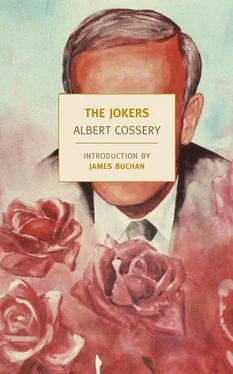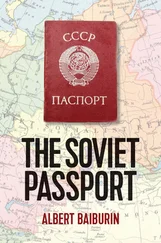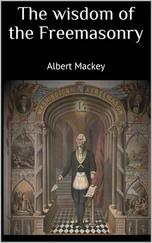“I’m delighted to hear it,” said Taher, surprised by how easy it had been (and smelling a trap). Can you take me to him tonight?
“If you like. You’re in luck — I was planning to go see him. Taher, I hope that we can join forces again. I’ve never stopped thinking about you.”
Just then the shadowy form of a patrolling policeman — he’d been slowly working his way along the length of the parapet — came to an abrupt halt in front of them. The two young men were startled. This representative of order looked like a hungry ogre in search of stray infants on the cliff road. They waited in silence for him to reveal the nature of their offense.
“Public assemblies are forbidden,” he growled. “Go on, walk!”
“But there are only two of us,” said Karim, delighted at this interruption.
“Two or a hundred, it’s all the same," the policeman went on. "Get going!”
He skulked away from them silently.
“Did you hear that son of a bitch!” Karim burst out.
“He’s just a poor sucker following orders,” said Taher. “It’s not his fault that he doesn’t know better. It’s up to us to teach him.”
“You really are crazy! Do you think I’m going to live a thousand years? I’ve only got one short life and you want me to spend it educating this gun-toting assassin?”
Taher shook his head sadly, like someone who no longer expects to be understood. He couldn’t wait to see Heykal and tell him face-to-face just what he thought of him.
“Well, let’s go,” he said. “But first I have to take these shoes to the cobbler.”
“At this time? Nothing’s open.”
“What do you think, that I’m going to leave my shoes with a capitalist cobbler! I have a friend who keeps his shop open all night — it’s one of our meeting spots. It’s not far from here; come with me.”
Karim made a gesture of assent, then slipped his arm through Taher’s and they set off. They crossed the road and made their way into the city’s sordid depths, leaving behind the cliff and its enchanted scenery.
Once the introductions had been made, the three of them sat in Heykal’s living room. They were silent, waiting for Siri, as slow and sleepy as ever, to serve them drinks. It took Siri a long, almost interminable time to acquit himself of his task, but nobody was paying any attention. They were too caught up with their extraordinary meeting to be distracted. Finally Siri set three glasses of rose water on the small low table, then left the room. But the silence refused to break.
Heykal observed Taher with the curiosity of an antiques dealer assessing a rare piece. He wasn’t displeased by the visit; it was an opportunity to thoroughly examine this old friend of Karim’s — one of the most dangerous revolutionaries in the city. He could tell Taher was ready to bite, but that he was still too polite to interrupt the silence with hostile words. He sat unhappily on the edge of his chair, as if ashamed to find himself in such contemptible company. There was no mistaking the glances he continued to shoot at Karim, as if holding him responsible for the whole painful situation. Heykal meant to wait patiently until Taher was thoroughly prepared to state his grievances. He was already fairly sure he knew what Taher had come all this way to find out, and he was curious to see him at work. What arguments would he bring to bear on Heykal’s perfect serenity? In this confrontation of two concepts, different both in essence and application, Taher had already lost. He was out of his element. Heykal felt a twinge of pity; the fight was plainly unequal. What aberration had led this caveman, this violent fanatic, to think that he could come here and get away with provoking Heykal? What was the temptation? Heykal grew positively dizzy at the thought that this stubborn, spiteful revolutionary had been unable to resist the magnetism of his scorn. Conscious of his own influence, he felt a flash of tenderness for his visitor, as if Taher had come bringing love instead of hatred.
Taher’s face bore an expression of manifest displeasure, even repulsion; he was all shrunken up, like a man surrounded by rats. His comrade, the cobbler, had loaned him some sandals belonging to a client who had died, and his toes wiggled nervously under leather straps. He didn’t know how to begin. He hadn’t expected such a courteous reception, or the undeniable charm of his host, who, draped in his purple dressing gown, held court on the sofa across from him like a great lord receiving the respects of a humble visitor. Worst of all, Taher was conscious of his poverty, and for the first time in his life he felt the indignity of it. He was lost in this well-appointed bourgeois living room with its furniture gleaming with cleanliness, its gilded, red velvet — covered chairs in a hideous, outdated style that were for him — having spent his whole life in slums and prisons — the height of affluence and leisure. What Taher objected to was this opulence, rather than the man who was hosting him in his house — for Heykal’s ideas disconcerted him; he had to admit that he’d never encountered anyone like him. The man wasn’t one of the executioners and he wasn’t among the condemned. Somehow he fought power in his own way — a way that was an insult to those who paid for revolt with their blood. Taher couldn’t imagine the possibility of a revolution that lacked a certain dose of hatred, and he was growing impatient, since Heykal appeared to be without a trace of the vengeful anger inherent in every oppressed being. He seemed to recognize the bloody-minded stupidity of the adversary and even to rejoice in it. Taher was exasperated by his host’s calm simplicity; it offended his unflinching determination to fight or die. But maybe all this was only for show; maybe Heykal was just trying to seduce him, to lure him into his tenuous, fragile universe. Taher wasn’t going to let that happen. The whole purpose of being there was to deflate the pretensions of this aristocrat with his insinuating charm. Karim was courting disaster, and he had to save him.
“Heykal effendi,” he began. “I came here—”
“I know why you came,” Heykal interrupted, speaking in a soft voice, raising his hand in a gesture of peace. “That can wait. First let me simply enjoy the pleasure of your company.”
“What infinite generosity!” Taher resumed. “But that’s enough for now, I’m sorry to say. What I want is an explanation. I’ve already told this turncoat”—he pointed at Karim—“just what I think of what you’ve done. It’s a complete disaster. The police think we did it, and that’s an insult to our honor as revolutionaries. What kind of game do you think you’re playing?”
Heykal bore up under this brutal, but impulsively frank, attack with a smile of exquisite politeness. So Taher had come to defend his revolutionary honor! He didn’t want the police to take him for a joker — that was all he cared about. And what ardor and enthusiasm his voice revealed when it came to the insult to his honor! He needed those criminals to respect him! How pathetic for a rebel! Even he couldn’t break out of the vicious cycle of power. He played the game of honor and dishonor, just as he’d been taught to do. He’d never escape. He was more of a prisoner than a prisoner in a cell because he shared the same myths as his adversary; they grow and grow and surround everything like unbreachable walls. Heykal hoped that his gaze wasn’t too visibly ironic; he didn’t want to let his guest down.
“Games,” he said, looking pensive. “You’re right to talk about that. Because we’re all playing a game, aren’t we, Taher effendi? I profoundly regret that my game has given you offense and caused you trouble. But any man has the right to express his rebellion in his own way. Mine is what it is; at least it doesn’t harm the innocent.”
Читать дальше












